Books are some of the best friends a pastor can have. How to know which friends to have is quite difficult, for as the inspired Preacher said, “Of making many books there is no end” (Ecclesiastes 12:12). Every so often I recommend three books for pastors on a given topic, hoping the suggestions can serve you in some way.
I’ve held off on this post for a long time. Mostly because offering one’s opinion on a systematic theology is like wading into the heated waters of declaring which college football team belongs in the national championship. Nevertheless, it’s feels like high time to go swimming in the systematics. If ever Ecclesiastes 12:12 is true it’s in the area designated “ST.” Each year offers important contributions to the field with individual titles trying to carve out some niche to get attention. It seems utterly impossible for ordinary pastors to keep up.
In order to save us all much time in reading, and help myself along the way for this post, I’ve limited myself to one-volume systematic theologies. So Turretin is out, à Brakel stays in the bullpin, and unhappily the venerable Dr. Hodge won’t be coming out of retirement for this one.
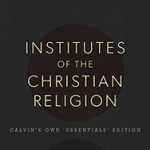 Institutes of the Christian Religion: Calvin’s Own Essential Edition by John Calvin. The famous Battles translation of Calvin’s magnum opus comes in two volumes, but thankfully Banner of Truth’s steadfast service still lets me get Calvin onto the list. This edition represents Robert White’s translation of the 1541 edition of Calvin’s Institutes of the Christian Religion. Carl Trueman says, “Calvin aficionados will know that the 1539 and 1541 editions embody key structural changes and elaboration of the somewhat brief 1536 edition and stand in significant continuity with the 1559. It is also worth knowing that the French editions were often less caustic about opponents and more explicitly precise in their polemical targets than the Latin.” A spiritual feast awaits any and all who come to Calvin’s table.
Institutes of the Christian Religion: Calvin’s Own Essential Edition by John Calvin. The famous Battles translation of Calvin’s magnum opus comes in two volumes, but thankfully Banner of Truth’s steadfast service still lets me get Calvin onto the list. This edition represents Robert White’s translation of the 1541 edition of Calvin’s Institutes of the Christian Religion. Carl Trueman says, “Calvin aficionados will know that the 1539 and 1541 editions embody key structural changes and elaboration of the somewhat brief 1536 edition and stand in significant continuity with the 1559. It is also worth knowing that the French editions were often less caustic about opponents and more explicitly precise in their polemical targets than the Latin.” A spiritual feast awaits any and all who come to Calvin’s table.
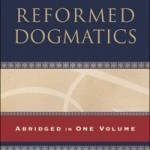 Reformed Dogmatics: Abridged in One Volume by Herman Bavinck. If Calvin is the king of Reformed theology, Bavinck surely is The Boss. Informed readers will know Bavinck’s magisterial Reformed Dogmatics comes in four volumes, but this abridgment is worth every penny (and kudos to John Bolt for his incredible work). Here you encounter one of the greatest intellects, scholars, and systematicians Reformed theology has ever produced. Although Bavinck—for me at least—doesn’t have the same doxological quality as Calvin, his work still has unusual power in promoting piety. So good is The Boss that even though this abridgment loses some of the original volumes’ grandeur, it still beats out just about everything else. I’ve always heard Berkhof’s famous ST is really the first English language abridgement RD. So you could go with that one here, yet The Blue Pill (as we called it in seminary) is the definition of turgid.
Reformed Dogmatics: Abridged in One Volume by Herman Bavinck. If Calvin is the king of Reformed theology, Bavinck surely is The Boss. Informed readers will know Bavinck’s magisterial Reformed Dogmatics comes in four volumes, but this abridgment is worth every penny (and kudos to John Bolt for his incredible work). Here you encounter one of the greatest intellects, scholars, and systematicians Reformed theology has ever produced. Although Bavinck—for me at least—doesn’t have the same doxological quality as Calvin, his work still has unusual power in promoting piety. So good is The Boss that even though this abridgment loses some of the original volumes’ grandeur, it still beats out just about everything else. I’ve always heard Berkhof’s famous ST is really the first English language abridgement RD. So you could go with that one here, yet The Blue Pill (as we called it in seminary) is the definition of turgid.
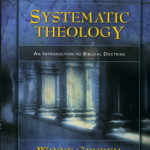 Systematic Theology: An Introduction to Biblical Doctrine by Wayne Grudem. When I was seventeen a Christian brother I greatly respected sat me down and said, “Do you want to read Grudem’s Systematic with me?” I was little more than a soccer player with tons of time on my hands, so I said, “Why not?” We each grabbed a copy and my understanding of systematics has never been the same. Although I find myself differing from Grudem as the years go by on several points I still believe this is a classic of evangelical theology. The operative words with Grudem are are clarity and humility—two things in which we can always grow. An advantage of this systematic is that it’s helpfully been distilled into a 500+ page version called Bible Doctrine, which serves as a terrifically useful discipling/training resource for those unable to work through the big one.
Systematic Theology: An Introduction to Biblical Doctrine by Wayne Grudem. When I was seventeen a Christian brother I greatly respected sat me down and said, “Do you want to read Grudem’s Systematic with me?” I was little more than a soccer player with tons of time on my hands, so I said, “Why not?” We each grabbed a copy and my understanding of systematics has never been the same. Although I find myself differing from Grudem as the years go by on several points I still believe this is a classic of evangelical theology. The operative words with Grudem are are clarity and humility—two things in which we can always grow. An advantage of this systematic is that it’s helpfully been distilled into a 500+ page version called Bible Doctrine, which serves as a terrifically useful discipling/training resource for those unable to work through the big one.
HONORABLE MENTIONS
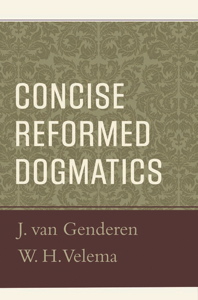 Concise Reformed Dogmatics by J. van Genderen and W.H. Velema. If it wasn’t for the Bavinck abridgment this title would in top three. I find it tremendously undervalued. The two Dutchmen write with winsome earnestness and have even managed to use an ingenious method: some of the text is in smaller font size than the rest. Why? The regular-sized text represents information essential to the study of theology, while the smaller-sized text is for those who want to dig into more of the technical matters and debates. Some people may not prefer the formatting, but it’s more pleasing to the eye than you’d expect. CRD will satisfy students of any ability.
Concise Reformed Dogmatics by J. van Genderen and W.H. Velema. If it wasn’t for the Bavinck abridgment this title would in top three. I find it tremendously undervalued. The two Dutchmen write with winsome earnestness and have even managed to use an ingenious method: some of the text is in smaller font size than the rest. Why? The regular-sized text represents information essential to the study of theology, while the smaller-sized text is for those who want to dig into more of the technical matters and debates. Some people may not prefer the formatting, but it’s more pleasing to the eye than you’d expect. CRD will satisfy students of any ability.
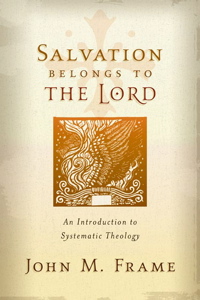 Salvation Belongs to the Lord: An Introduction to Systematic Theology by John Frame. I could put Frame’s full-length ST in this spot, but that publication really a “Best of John Frame on Theology” type book (heavily tilted towards content from his Doctrine of God and Doctrine of the Word of God). This ST introduction is Frame at his finest—relentlessly biblically and warmly ecumenical. It also serves a layman’s intro into his well-known tri-perspectivalism. I can’t tell you how many times I’ve handed out his chapter on eschatology from Salvation Belongs to the Lord, which—I think—says something about its usefulness. This is another undervalued resource every pastor would do well to work through.
Salvation Belongs to the Lord: An Introduction to Systematic Theology by John Frame. I could put Frame’s full-length ST in this spot, but that publication really a “Best of John Frame on Theology” type book (heavily tilted towards content from his Doctrine of God and Doctrine of the Word of God). This ST introduction is Frame at his finest—relentlessly biblically and warmly ecumenical. It also serves a layman’s intro into his well-known tri-perspectivalism. I can’t tell you how many times I’ve handed out his chapter on eschatology from Salvation Belongs to the Lord, which—I think—says something about its usefulness. This is another undervalued resource every pastor would do well to work through.
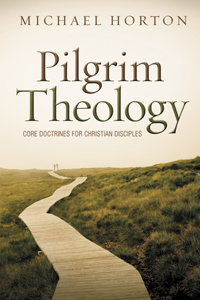 Pilgrim Theology: Core Doctrines for Christian Disciples by Michael Horton. I wasn’t too big a fan of Horton’s The Christian Faith. I’m not on the speech-act theory train and the whole volume seemed unbalanced on many different issues. So when I heard he was publishing a second, shorter ST entitled Pilgrim Theology I figured it would be his version of what Bible Doctrine is to Grudem’s ST and thus not worth much consideration. How grateful I was to be proven wrong! Pilgrim Theology (what a great title, by the way) is more a rewrite than abridgement, and all Horton’s strengths shine through. His metaphors work, his articulation is sound, and the flow is even. If you are looking for a contemporary ST other than Grudem or Frame, this might be the one for you.
Pilgrim Theology: Core Doctrines for Christian Disciples by Michael Horton. I wasn’t too big a fan of Horton’s The Christian Faith. I’m not on the speech-act theory train and the whole volume seemed unbalanced on many different issues. So when I heard he was publishing a second, shorter ST entitled Pilgrim Theology I figured it would be his version of what Bible Doctrine is to Grudem’s ST and thus not worth much consideration. How grateful I was to be proven wrong! Pilgrim Theology (what a great title, by the way) is more a rewrite than abridgement, and all Horton’s strengths shine through. His metaphors work, his articulation is sound, and the flow is even. If you are looking for a contemporary ST other than Grudem or Frame, this might be the one for you.
Check out my past suggestions in the “3 Books Every Pastor Should Read” series here.
